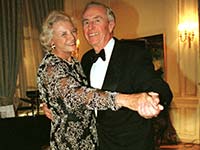Staying Fit
A nursing home aide discovers a Kentucky couple, who aren't married to each other, naked in the same bed together.
A woman in Iowa complains when her roommate's husband, who doesn't live in the facility, climbs in his wife's bed to snuggle and, she claims, have sex.


AARP Membership— $12 for your first year when you sign up for Automatic Renewal
Get instant access to members-only products and hundreds of discounts, a free second membership, and a subscription to AARP the Magazine.
A man likes to fondle fellow residents in his Minnesota dementia-care unit; nobody assesses whether the women invite or welcome the touch or are being assaulted.
As if moving aging parents into a long-term care facility wasn't painful enough, now comes this uncomfortable twist: getting calls about their sex lives there. (Remember when roles were reversed when it came to fretting about sex drives?)
In the wake of several high-profile cases, facilities — eager to avoid liability — have begun to develop guidelines that preserve residents' right to pursue sexual pleasure in privacy, while protecting them from unsafe, unwanted or abusive situations. So far only about a quarter of facilities have policies on intimacy and sexual behavior, according to a 2013 survey by AMDA — the Society for Post-Acute and Long-Term Care Medicine. Almost half said that developing a policy was "planned" or "uncertain."


"The nursing home field is more highly regulated than any other, but there are almost no rules regarding sexuality," says Gayle Doll, director of the Kansas State Center on Aging and author of Sexuality & Long-Term Care. She defines sexual expression as anything from compliments to touch to sex. "More facilities are becoming enlightened to the fact that this is something people are thinking about, and maybe they should find ways to help people become comfortable."
Indeed, attraction, hugging, flirting, fondling and, yes, sexual relations know no expiration dates. "This is a time of life where many people return to a certain romance of what they were like in their 20s. You can no longer jump out of planes, but you can still generate excitement in your life," says geriatric psychiatrist Ken Robbins, a clinical professor at the University of Wisconsin-Madison. Social connections and human touch help ward off the depression and loneliness that old age and institutional living can bring, he adds.
Many shades of gray complicate sexual issues in nursing homes
Dementia
More than half of nursing home residents have Alzheimer's disease or another form of cognitive impairment, according to the Alzheimer's Association. "Some people with dementia may become disinhibited," Robbins adds. "And in one type, frontotemporal dementia, disinhibition shows up before other cognitive issues, so the person can still think reasonably well. In a place that's not very exciting, he or she may be looking for ways to have fun and have something to look forward to each day." Like suggestive banter with the new gent in the dining hall, for example, or flirting with the lady in room 206.
Are people able to consent to sex if they can't balance a checkbook, or if they can barely speak? Or is sex more an impulse akin to eating, a pleasurable appetite that one retains the ability to indulge? Who gets to decide what's safe and appropriate?
"Hands down, most issues that become problems have to do with dementia," Doll says.


































































More From AARP
How to Be an Effective Advocate for Aging Parents
5 skills that will help you care for the ones you love